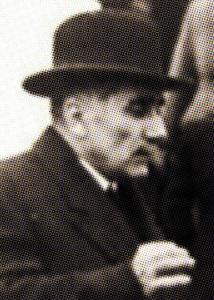 Nicolae Malaxa was a Romanian
industrialist who lived at the end of the 19th century and the beginning
of the 20th century and who created one of the biggest industry
holdings of the interbelic period in Romania. His holdings were
nationalized by the Communist party and the Malaxa heirs are currently
on their way to receiving compensation for the nationalized assets
through Fondul Proprietatea, which will be listed on the Bucharest Stock
Exchange on January 25. But who was Nicolae Malaxa and what did he
achieve in the first half of the last century?
Nicolae Malaxa was a Romanian
industrialist who lived at the end of the 19th century and the beginning
of the 20th century and who created one of the biggest industry
holdings of the interbelic period in Romania. His holdings were
nationalized by the Communist party and the Malaxa heirs are currently
on their way to receiving compensation for the nationalized assets
through Fondul Proprietatea, which will be listed on the Bucharest Stock
Exchange on January 25. But who was Nicolae Malaxa and what did he
achieve in the first half of the last century?Nicolae Malaxa was born in 1884 in a family of Greek origins from Husi. He started his studies in Iasi and went on to study engineering in Germany. The Romanian engineer, who went on to become Romania’s industry tycoon in the interbellic period, built the first railway stock shed in 1921, at the outskirts of capital city Bucharest. Two years later, he started building a factory near Halta Titan, which was opened in 1927. The same year, the factory signed a contract with the Romanian Railways to build local locomotives. Malaxa took bank loans and received an advance payment from the Romanian Railways and, with the help of 180 German workers, started building the first Romanian locomotive. The Malaxa factory soon became the best performing railway stock factory in Europe at the time. In 1937 and 1938, an ammunition production line became functional within Malaxa’s railway stock factory.
Nicolae Malaxa has also set up a steel pipes factory – later known as the Republica factory. His factory in Resita also created the first Romanian car in 1945. It was called Malaxa. The industrialist was also shareholder in several other factories: Astra Arad, Unio Satu Mare, IOR Bucharest.
The Malaxa holding included the Uzina de Tuburi si Tevarii (Republica), Uzina Nicolae Malaxa (Faur), Tohan Zarnesti factories and Magazinele Unite de Fierarie in Galati, at the end of the 30s. Production lines in Malaxa’s factories were flexible and adaptable to whatever it was needed to produce.
Historians connect Malaxa’s business success to his involvement in politics, as the industrialist was known to be one of the people close to the Royal House – King Carol II. According to historians, much of his business success was based on the contracts with the state, while some of the profits Malaxa was making returned to the Royal House as donations.
The investor financially supported most of the political parties – the Legionnaire movement/ the Iron Guard and the Communist party.
In 1941, he was accused of collaboration with the Legionnaires/the Iron Guard and his factories were nationalized, while he remained a consultant for the Communist Party. However, he managed to get along with the Communist regime, saying he was oppressed during the Legionnaire regime.
In 1948, he left on a trip to Vienna and never returned to Romania, emigrating instead to the US. The communist regime sentenced him to death for crimes of war. Producing weapons during the war was considered a crime against the Soviet Union. In the US, he managed to get American citizenship and started doing business again, even though without the same success that he had had in Romania. After the US authorities found about his political past – the collaboration with the Iron Guard and with the Communist Party, they tried to expel him from the country, but to no success. Nicolae Malaxa died in 1965 in New Jersey.
Back to Romania, the Malaxa factories were renamed the 23 August factories during the communist regime, and became Faur SA after 1989. After the 1989 revolution and the fall of communism, Romania slowly started to compensate those whose wealth had been confiscated during the communist period. Nicolae Malaxa’s daughter, Irina Malaxa, married scientist George Emil Palade in 1946 (Palade is known for having received the Nobel prize in 1974). Their children, Georgia Palade Van Dusen and Philip Palade, as well as Loreen Ellen Malaxa, the wife of a deceased Malaxa nephew, have asked for compensation titles of around USD 310 million from Fondul Proprietatea, a fund which was created to compensate those whose properties had been confiscated and who cannot be redeemed in kind. The three heirs, who currently live in the US, together hold more than 7 percent in Fondul Proprietatea shares.
http://www.romania-insider.com/famous-romanians-nicolae-malaxa-the-tycoon-who-built-the-first-romanian-locomotive-and-car/17207/






























6 comentarii :
Obiceiuri romanesti vechi, coruptia si spaga la stat...
La început a făcut totul pe bune, când s-a dezvoltat a dat şpăgi, pentru comenzi de stat. Era concurent cu Max Auschnitt.
Spaga la stat nu este "obicei romanesc"
Este un obicei practicat in toata lumea ca sa se castige bani mai usor.
De asta statul trebuie sa fie cat mai mic , pentru a evita spaga.
In timpul razboiului ,normal ca puterea statului creste.
Si creste si spaga...
Culmea e ca pe atunci statul romanesc era monarhie, iar Casa Regala nu se sfia sa primeasca "donatii"
Deh, Carol II era cam apucător...
Las, ca nici cu Mihai nu mi-e jena !Ai vazut cum isi si-a mai recuperat proprietatile...
Daca mi le-as fi recuperat si eu, poate ca n-as mai zice nimic. Retrocedarile s-au facut tot cu spaga
Clăpăugul a făcut târgul pe vremea lui Năstase.
Trimiteți un comentariu